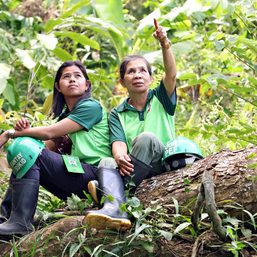SUMMARY
This is AI generated summarization, which may have errors. For context, always refer to the full article.
![[DETOURS] Women in jiu-jitsu: Not just ‘one of the boys’](https://www.rappler.com/tachyon/2021/03/Detours-JiuJitsu.jpg)
Editor’s note: Being a jiu-jitsu athlete requires commitment and a lot of sacrifices whether you’re a man or a woman. Carol knows it well. But despite all her hard work, sometimes all she gets is a mundane comment. Get to know her story. You, too, can share your life’s greatest detours. Here’s how.

I sometimes see this caption on social media that accompanies a team photo shared by some women who train Brazilian jiu-jitsu (a martial art that can be simplistically explained as grappling with a mix of wrestling and judo): ‘one of the boys,’ in reference to the occasional class with no other women in attendance but you.
Thankfully, it is not as atypical as one might assume.
Parallel to jiu-jitsu’s development of a national sports association in 2015, Filipino women experienced early success in the international scene despite the scarcity of female training partners.
With the opportunity to thrive in competition against fighters while considerably minimizing any height or weight disadvantage, the sport has drawn more students across gender (and age) through the years.
At local gyms, fewer women may be attending the more advanced classes compared to men. However, there are generally enough practitioners to convene an all-female training session and meet others who are as maniacally smitten by the sport; and more so, as you progress and test yourself by signing up for tournaments at different levels and locations.
At times, it’s a solitary passion that few of your family or friends will support and understand. Jiu-jitsu, even when taken up recreationally, demands the rigor of routine. They call it ‘mat time’; it’s what you must invest in order to even gradually gain some measure of improvement.
What you lose is time for everything else, dinner or movie dates for instance – stuff that happens when you’re stuck in jiu-jitsu class after work. As for drinks, chances are you’re watching or cutting weight, so you miss out on that, too.
LISTEN TO DETOURS FROM HOME PODCAST
You will have very few fans in your social network rooting for you. After all, it’s usually not encouraged, especially among women, to have your face and hair in a perpetual mess (I am used to this state as a child crazier about sports than style, though it’s deemed less becoming when you’re unable to outgrow it).
It’s an art that offers as many gains as tradeoffs though abundant with paradox and simultaneously, a source of exasperation and endearment. First, you will be at your fittest and strongest, both physically and mentally, while habitually calloused, bruised, and aching. Second, you’ll find that fewer things will faze you, even off the mats. Maybe it’s partly the serene knowledge that you can put someone to sleep, regardless of size or status. But that early morning meeting that could’ve been an email? It won’t stress you as much as it does your coworker or boss; after all, at the end of the day, you have training.
And finally, there’s no better embodiment of Aristotle’s statement that ‘’the more you know, the more you know that you don’t know’’ than the so-called jiu-jitsu journey. You lose, you win, then you lose again but the more you will not want to quit. Sustaining success is not only elusive; it is ephemeral and you can easily be set back – by an injury, a busier schedule, better opponents, and now a pandemic. But there’s always the daily promise of a breakthrough if you choose to keep at it; it’s the beauty of our sport.
I was already in my mid-30s when I first tried jiu-jitsu and close to 10 years of highs and lows later, I am still here. Competition has taken me to Insta-ready sites like Thailand, Tokyo, and Seoul to as far as Ashgabat in Turkmenistan. Pre-COVID-19, most of us were raring to prepare for competition season here while eyeing some tournaments abroad.
What I continue to love about jiu-jitsu is how it aligned with my disregard for traditional timelines. So while most tangentially worry about how the ongoing public health crisis has affected most contact sports (among other more pressing concerns, undoubtedly), I still think I’ll have jiu-jitsu in my life again. I have this one certainty in our shared season of doubt.
In the Philippines, with a mostly ageist culture wherein the erstwhile honorific ‘Tita’ wavers between mock self-deprecation and passive-aggressive disdain, I am a unicorn; that odd and old woman hellbent on training and competing as hard as any jiu-jitsu athlete.
But on the mats, especially outside the country, where we can pit ourselves not just against women of similar weight but also age, I am gloriously ‘one of them’; just us women hellbent on training and competing as hard as any jiu-jitsu athlete.
Women in jiu-jitsu are also curious rivals, such that after facing each other in intensely contested matches, we can end up exchanging contact information and plans to visit each other’s gyms. It is far from the stereotypical expectation of male aggression in combat sports that would frown upon fraternizing with the ‘enemy.’
There is an undeniable kinship in seeing yourself in others; especially for a sport that at the onset, being far from mainstream and predominantly male, had fewer relatable role models. Whether we win or lose against each other, ours is a community.
As it should, because I realize that there is also that recurring battle to keep more of us around over time; I have lost more than a few training partners to their career, marriage, motherhood, or perhaps to a simple change of mind or priorities. But unlike most sports stories, in jiu-jitsu, there’s no shortage in comebacks. Especially for us, there are no late starts (or restarts).
For instance, I met one of my dearest friends at a jiu-jitsu seminar in Singapore. I had just moved for work; she was about my age, a mom of three, so training had taken a backseat for us both. When we became regular training partners, we found ourselves dreaming of taking trips and joining tournaments again, which meant making up for lost mat time.
Ultimately, jiu-jitsu draws its strength not from being tagged as ‘one of the boys,’ as if it were some enviable badge of courage. What will truly grow the sport is our capacity to share even a shred of this aspiration for greatness with more girls and women. – Rappler.com
Carol Pajaron is a 44-year-old purple belt in Brazillian jiu-jitsu who works in the development sector. She actively competes in tournaments here and abroad.
Add a comment
How does this make you feel?





There are no comments yet. Add your comment to start the conversation.